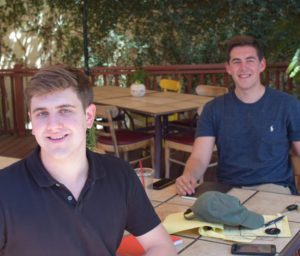
Michael Gofman and Matthew Wigler might seem an unlikely pair in today’s world of tribal politics, but the Republican Student Body President from UC Davis and Democrat student government senator at Stanford are working together to study seven of California’s so-called “purple” districts—congressional districts that voted for Hillary Clinton for president but also voted for a Republican congressional representative.
Though they might differ on issues and answers, both Gofman and Wigler agree that today’s divided political world is bad for the United States and even worse for the world as a whole. They’re studying purple districts and swing voters in California to see if they can solve the puzzle of today’s polarized partisanship.
Wigler is not only a student senator, he’s also vice president of the Stanford College Democrats. One of his goals is to correct the widespread impression that millennials are apathetic about government and politics.
“We millennials care deeply about solving the problems we’ve inherited,” he said Thursday, “and we can only do that through compromise and cooperation.”
Given that the UC Davis student body demographic is heavily Democratic—the last Republican to win the presidency was in 2003— Gofman’s party affiliation might seem puzzling. But Gofman says he realizes the party is in trouble, and he thinks the answer is to change it from within.
“My ideal Republican is Dwight Eisenhower,” he says. Mention the likes of Donald Trump and Ann Coulter, and Gofman’s features crinkle. He’s no fan of either of the new Republican firebrands. “At the end of the day, the future has to be bi-partisan,” he says.
Wigler and Gofman have already interviewed two dozen people in California Congressional District 10 (CA-10), and have some interesting findings.
“No matter their stand on issues,” said Wigler, “most people we’ve interviewed in this district describe themselves as moderate or middle of the road.” Wigler also cited an interesting study from govtrack, an independent research organization that, “tracks” and analyzes the U.S. Congress.

“According to govtrack,” said Wigler, “Jeff Denham and Gary Condit were only 9 percentile points apart on issues.” Condit was a typical “Blue Dog” Valley Democrat until brought down by the Chandra Levy Scandal in 2002. Denham has since become identified with Donald Trump, but Trump is hardly a typical or traditional Republican.
Wigler’s point was that especially in the San Joaquin Valley, conservative Democrats and Washington Republicans were closer politically than people might think, and thus able to work together without the tribal divisions that mark the parties today.
Gofman and Wigler said another thing they’ve learned is that politics used to, “revolve outside the valley,” in the sense that national politics rarely intruded in a region where local issues dominated. Wigler said that if one sentence could sum up their study so far, it’s, “National intrusion into local politics.”
“We’re seeing both Jeff Denham and Josh Harder trying to lay claim to local status,” he said—Denham is clearly trying to cast Turlock native son Harder as a San Francisco elitist while Harder consistently emphasizes his deep Valley roots and Denham’s absence from his own district.
Another factor in the “purple” status of CA-10 is the power of single issue preferences and divisions. Wigler and Gofman have interviewed people who are pro-choice but won’t vote for a Democrat because they are also Second Amendment absolutists and believe Democrats, “won’t respect gun rights.”
Gofman and Wigler also see the division that has split the nation in terms of a media problem. While staying at the Doubletree Hotel in Modesto, they noticed three televisions behind the hotel bar. The television on the left was showing CNN, the one in the middle ESPN, and the one on the right, Fox.
“When people get news from different sources,” said Gofman, “they see different realities. While CNN might be covering the Russia investigation, Fox News could be covering gun rights issues in Oklahoma. Whatever is selected as news is also skewed and skews reality.”

Wigler and Gofman found that even though immigration is a national issue, it quickly becomes local in a district that relies heavily on immigrant labor. It’s also specific to individuals like the “Dreamer” from Patterson who’s now twenty-six years old and was brought to America aged two. “What happens if I have to go back to Mexico after twenty-four years in the United States,” he says. “I don’t even speak Spanish that well.”
As the sons and grandsons of immigrants themselves, Wigler and Gofman see a special need to restore American politics to the ideals their ancestors sought when they fled tyranny in Russia and the Ukraine. They also realize it won’t be easy.
But Republican Michael Gofman was able to win office at “liberal” UC Davis almost certainly because of his credibility as a moderate, and his and Wigler’s research is showing most people self-identify as moderates and would prefer to vote for moderates.
If that’s the case, the key for Gofman and Wigler is to find that elusive place in American politics that used to be called “middle ground.” These millennials, aged 20 and 21 respectively, see a positive future of bi-partisan compromise and positive government. Given their intelligence, pragmatic idealism, and ancestral determination, we’re betting they can help achieve it.

Well, there is hope for the future……time to let these folks take the reins then.
Could not agree with you more
Well any facts might have helped this essay on their opinions .Scandal and promises affected the vote here and how many voting millenials are there?? This is weak
Explain why Jose Hernandez lost,a HUGE mystery to me